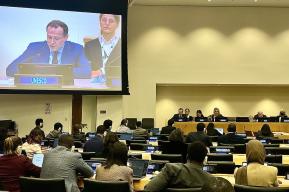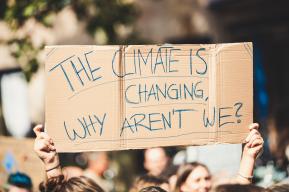Article
Meet three inspiring young change-makers in Education for Sustainable Development

Young people have the most creative and ingenious solutions to tackle sustainability challenges. Youth all over the world have been increasingly active in demanding urgent and decisive change, in particular to address the climate crisis.
Engaging and mobilizing young people to become agents of change is key to achieve the Sustainable Development Goals (SDGs). Education can empower young people with the values, the knowledge and the skills to take action. That is why youth is one of the priorities of the recently launched roadmap for the next 10 years of Education for Sustainable Development.
In November, UNESCO dedicated an online workshop to young people and invited three inspiring young change-makers - Nicolas Klasen, representative of YoupaN, from Germany; Melati Wijsen, founder of ByeBye Plastic Bags and Youthtopia, from Indonesia and Isaac Makinya, member of global youth representatives of World Scout and member of the National Youth Forum Committee, from Kenya - to discuss the following questions, in relation to the current crisis:
- What are the enabling conditions for young people to become change agents for sustainability?
- How can Education for Sustainable Development (ESD) help young people stay resilient in challenging situations?
The workshop kicked off with a mind map of responses to the question ‘what do you need in order to stay resilient?’ before the three workshop speakers shared their experiences and answered some of the questions of the viewers joining live.

Change starts in communities
The panelists highlighted the need for young people to stay connected to their local context, to observe their own communities and identify social and environmental issues they can address within their societies with their own skills and creativity.
Isaac Makinya, member of global youth representatives of World Scout and member of the National Youth Forum Committee, Kenya shared:
“I do this by observing the community around me, identifying the challenges they are facing and then using the skills and networks that I have, that I received from the Scouts movement and then I give support to the community members to solve their problems.”

Finding new ways to stay connected
The pandemic has been enormous challenge to young activists because a very important part of their work happens on the ground. That is why during the pandemic, technology and online networks have been crucial for young people to stay connected and continue their advocacy work.
“We started online working spaces, online collaboration processes and we tried also to create informal safe spaces, to play games also to have fun and keep our motivation.” (Nicolas Klasen, representative of YoupaN, Germany)

Education to support change-makers
When it comes to education, the young panelists highlighted entrepreneurial skills, social and emotional competencies and supportive learning environments as necessary to contribute positively to their communities and become resilient actors of change for sustainable development.
They also agreed that schools and education systems should help young people to nourish their passions and to build confidence in themselves.
“We have to identify what makes students, young people passionate about and how can schools and the education system become a support system to nourish that.” (Melati Wijsen, founder of ByeBye Plastic Bags and Youthtopia, Indonesia)

This event was part of an online workshop series organized by UNESCO, in cooperation with the Federal Ministry of Education and Research of Germany and the German Commission for UNESCO in preparation of the UNESCO World Conference on ESD.









